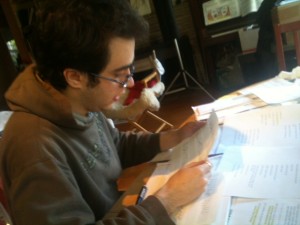Music has a language of it’s own. Composing for Samlandia is just another way to express my thoughts, emotions, points-of-view…only in the language of music — notes, dynamics, tempo.
When I was little, I couldn’t understand language. But, when my mother sang words to me, I could understand her. I have “perfect pitch” which is a specific difference in brain wiring that attunes my auditory perception towards absolute recall of a pitch as it was first heard without the aid of a reference pitch. In practice, perfect pitch is such a dominant auditory mechanism that it causes me to “shut off” my eyes when, for example, I play the piano.
The misconception about autism and musical ability is that you can have a kid with learning challenges who is very likely to shine in musical or artistic ability. With an educational paradigm that excludes musical and artistic education, young people who might otherwise be perceived for this cerebral brilliance are often missed. They simply don’t get the opportunity to demonstrate competence in an area where things come easily to them.
I have composed other musical scores in the past, but more abstractly, and not to go with words. The first song in Samlandia (Little Bell) is about the senses in response to a bell. Valier helps Sam to understand that starting small (like, with listening to the sound of a small bell) is the way to embrace the bigger things (the bigger bell and, metaphorically, bigger things in life).
My approach in composing this piece was to listen to different composers from the Romantic Era, like Tchaikovsky, Dvořák, and Mahler. When I got to the third movement of Mahler’s 3rd Symphony, that’s when I started writing the first song like crazy.
The calmness of the third movement was like walking through a deep forest. It starts in D-minor, with a very mysterious feeling, like gazing at stars in the cosmos. As it moves along, it’s almost like a season-changer. It transitions to an A-minor and the feeling uplifts to one of walking in dappled sunlight in the summertime with flowers blooming all around. When the Autumn comes, we’re back to D-minor which is sustained through Winter. Then, Spring and Summer follow again and D-major returns.
I approached my composition for Little Bell in a sweet and gentle way because the feeling is gentle. I wanted it to be open, to bring the scene from vulnerability to hope when Valier helps Sam to start small and not be afraid. Ultimately, I wanted D Major to dominate; D-major makes the music sound bright and that was my intention. But, I wrote the first few measures in D Minor to have it start sad and build to D Major where the music moves to sounding bright.
I stuck with it all day. It took me three hours to finish the melody (eight measures) for one piece of music. Then, after I was finished, my energy dropped like a weight.

